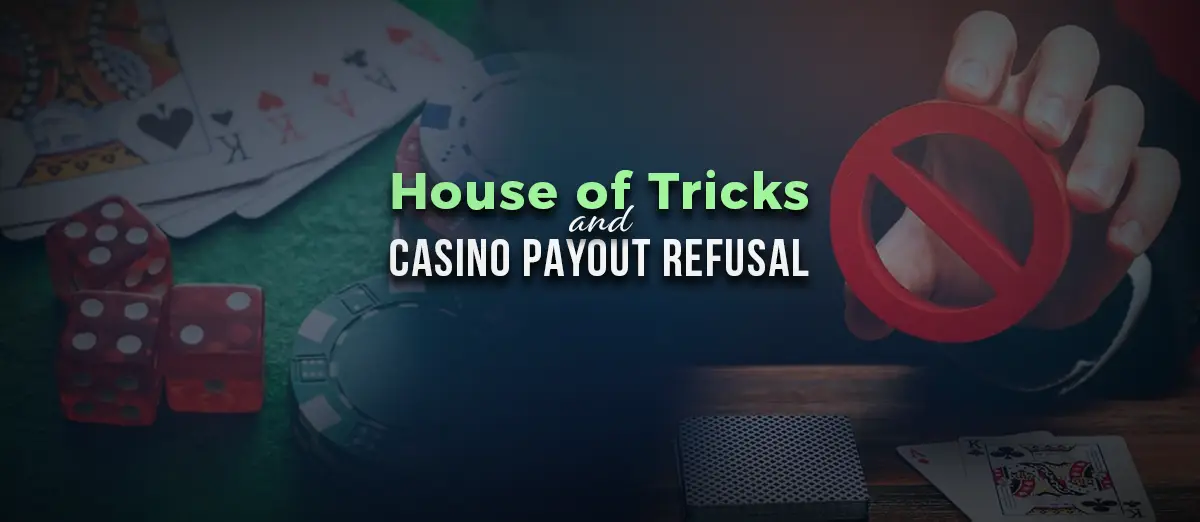R. Paul Wilson On: Decoding Casino Payout Denials

Knowing how to spot potential deception is crucial when money is involved in a financial transaction, especially in gambling. We've extensively discussed how cheats can manipulate games and how con artists can swindle money through clever schemes and casino scams. However, it's equally important to understand the dynamics when there's a breach of contract between players and the house.
Casinos have been known to refuse payouts to players, particularly when they're suspicious of unusually successful outcomes in games where large wins are statistically rare. While verifying the legitimacy of such wins is reasonable, there are instances where establishments outright refuse to honor bets that are not only honest but also incredibly unlikely due to the astronomical odds against them.
These instances reveal a significant imbalance, as the odds are typically in favor of the house. The rare "black swan" event in gaming or sports betting is a mathematical cost casinos accept to attract players dreaming of being exceptional winners. But what happens when a seemingly impossible bet actually wins, and the casino or sports book refuses to honor that bet? This parallels being victimized by a con artist, scammer, or pickpocket.
Exposing the Dark Side of Casino Refusal Tactics
A casino's refusal to payout is not just an isolated incident; it casts doubt on the integrity of the establishment, suggesting that any other extraordinary or hopeful bets made in the past would have met the same fate had they won, and the implications for future wagers are obvious. Recent incidents have shed light on this issue. For instance, in 2018, a New Jersey man sued a casino for refusing to pay out his $100,000 winning poker bet. In 2015, a UK woman won a £1 million payout in an online game, only to have the casino refuse the payment due to a system glitch.
These cases exemplify the dilemma players face when casinos refuse to pay out their winnings. Often, the legal recourse for players is limited, depending on the gambling regulations of their state or country. This necessitates a closer examination of the legal frameworks governing gambling and the ethical responsibilities of casinos to honor legitimate wins. Bookmakers are increasingly hiding behind clauses in their fine print to avoid payouts, and I'm noticing more stories where the common denominator is an unusually large win, prompting the bookie to claim some issue despite bets being honest.
Christopher Kozak recently placed a series of long-shot hockey wagers in Tennessee. When those bets landed, he was informed by the sports book that there had been an 'obvious error' and was only owed a refund. Kozak refused to accept this, leading the bookie to try renegotiating the odds. Throughout the process, the sports book repeatedly refused to explain the 'obvious error' they were using to refuse payment.
Kozak's story caught the attention of the press, and when journalists contacted the parent company, his canceled bets were finally paid out, with the company almost claiming they did so out of kindness rather than fear of prosecution or disastrous PR. It's unclear whether the law would have backed the player in this example, as gaming terms and conditions are often deliberately open-ended in favor of the house, making any bet vulnerable if the win is too costly for them.
This is akin to a scam called an 'alibi joint,' where players are coaxed into playing carnival games for attractive prizes that have been collecting dust for years. Even if players beat the laws of physics or the astronomical odds against them, the operator has a fistful of 'outs' to cancel any successful throw, shot, or guess.
"Your foot was on the line."
"You're supposed to throw over that string."
"You need to do it twice to win a big prize."
"There was an obvious error."
Behind the Odds - Secrets of the Bookmaker's Smile
What staggers me is how bookmakers do this without suffering the obvious penalty of players avoiding their services. Offering to accept wagers while only paying out those that are convenient should be a surefire way to kill their business. Years ago, I spent many hours in the Farmer's Market on Third and Fairfax in Los Angeles, hanging out with an old gang of (mostly) retired dice cheaters and card markers who shared a few secrets in return for a never-ending supply of card tricks.
One of them, PH, was also a bookie. Before any major game or boxing event, PH would collect bets from customers and stall operators, all indulging in a bit of illegal gambling under the radar. I accompanied PH on his rounds, collecting and paying off, and noticed he was always smiling and friendly, even to those who won - at least to their faces. When one bettor hit a particularly painful jackpot, PH whispered to me, "That lucky motherfucker must have kissed a leprechaun on the ass!" before smiling and joking with the guy as he handed over a thick envelope, already discussing upcoming games where PH hoped to win it all back.
I asked PH if he ever took bets he couldn't pay, so he gave me a lesson in laying off bets to cover potential disasters. PH admitted he'd been hurt by crazy bets occasionally when he couldn't cover from other players. However, he insisted he would always pay out. "You gotta keep them coming back," he told me, "otherwise they'll take their money elsewhere." Casinos and bookmakers should heed this advice. Like the people making bets under the table with PH at the Farmer's Market, players would (and should) take their business elsewhere if they learn a bet, even an outlandish one, isn't paid out happily.
Everyone should benefit from legal and honest gaming options, not ones managed in a little black book between market stalls and local authorities should monitor this to defend players against unfair games.
The Double-Edged Sword of Online Betting
If you're playing online, remember the internet offers both opportunities and risks. Take time to research and monitor where you play, ensuring that when your horse comes in, so do your winnings. Is this a scam? Ask Christopher Kozak. But at least by playing with a legitimate bookie, he eventually got paid. With a guy on the street, there's little you can do unless you've watched too many 1980s action movies, and that probably wouldn't end in your favor!
Incidentally, I asked PH if anyone ever lost money they didn't have. He said it happened all the time, but people always paid quickly, and PH never took enormous bets without cash on hand. More importantly, players knew if they didn't honor their wager, PH would have to sell their debt to someone much less amicable.





Review this Blog
Leave a Comment
User Comments
comments for R. Paul Wilson On: Decoding Casino Payout Denials